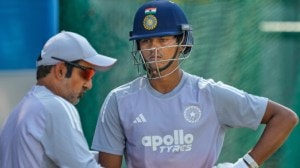The weight of victory
It is a burden Karnam Malleswari will gladly carry on her iron-burnt shoulders. The shiny bronze medal she has snatched may weigh consider...

It is a burden Karnam Malleswari will gladly carry on her iron-burnt shoulders. The shiny bronze medal she has snatched may weigh considerably less than the iron she is accustomed to pumping, but it has forever cast her as a rare sporting icon and role model. And it is an achievement that would be belittled if it were merely referred to as commendable. No doubt a historically medal-starved nation has reacted predictably with exuberant glee to the 26-year-old weightlifter’s success in inserting India’s name in the Sydney tally; but Malleswari’s victory lies in much more than that. The accomplishments that must be saluted are many. India’s first woman medalist at an Olympic Games. A medalist in a debut-making discipline. A triumph in what is popularly defined as a masculine sport. A thumping, 240-kg repartee to a raucous gaggle of part-time critics. A tryst with destiny honoured in spite of a marathon obstacle course laid out by bumbling sports administrators… Make way for India’s new golden girl.
With the benefit of hindsight, it would be tempting to declare that these milestones had been anticipated; but the two-time world champion, by all indications, had been as engrossed in fighting petty battles with critics and fellow sportspersons as she had been in reaching for the third component of the Games motto (swifter, higher, stronger). Moreover, questions will now have to be asked about the self-destructive politics that preceded the announcement of the weightlifting squad for Sydney. And once the lavish messages of congratulations stop pouring in, once the grateful announcements of cash awards conclude, the message encoded in Malleswari’s bronze medal must be addressed. That message is, rigorous athletic training, a sustained effort to foster a sporting culture can be put off no longer. That message is, our Malleswaris are exceptions in a society that seems to value its sportspersons (barring, of course, cricketers) for fleeting moments every two years when the Asian Games or the Olympics are roundthe corner. That message is, if a billion people really seek to extract a modicum of self-worth from a handful of medals when the world’s swiftest, highest, strongest gather, they must — each one of them — do their ever so little bit to achieve speed, height, strength. After all, it is only with a solid athletic base that a society can aspire to set new records in a wide range of sports. By way of proof, was it not just the difference in stamina levels in the India-Australia hockey tie on Tuesday that allowed the hosts to net an equiliser?
To be sure, Malleswari’s message also includes the callousness with which the few pursuers of excellence who do emerge are treated. Examine her difficult transition to the 69 kg class. Examine sprint queen P.T. Usha’s recent lament. “When I was 18 years old, I won a gold medal in 200 m in the world junior meet with a timing of 24.28 seconds. When Marion Jones was 18, she clocked 24.62 seconds. Today she is able to clock 21.5. I clocked only 23.25, that also at the age of 35. Who was responsible for my stagnant performance?” Who indeed? It is a question young Sunita Rani must not be given a chance to pose a decade from now.



- 01
- 02
- 03
- 04
- 05




























